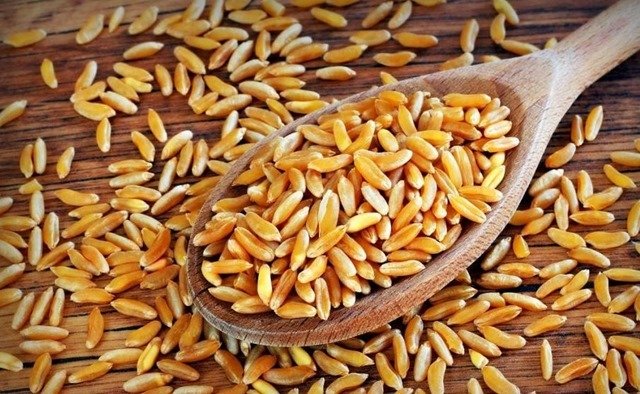With the name of kamut or khorasan we find a wonderful pure and quality wheat full of benefits and properties, very rich in essential nutrients.

Although much less known than common wheat, with the name of kamut we find a wonderful cereal that was already cultivated in Ancient Egypt around 5,000 years ago. It is more popularly known by the name of the brand under which this ancient variety is marketed ( khorasan wheat ), and today it stands out above all for being grown organically in the United States. In fact, as it has not undergone hybridization, it is considered a tremendously pure durum wheat, very rich in essential nutrients.
In the kitchen it is used mainly in the preparation of pasta and semolina, among which are noodles, macaroni, spaghetti and spirals. It is also used in the preparation of the popular and delicious couscous or bulgur, and it is ideal in vegetarian diets where it surprises with its qualities as a whole grain cereal.
However, it is not a suitable cereal for people with celiac disease because it contains gluten. Its flavor is generally sweet, smooth and slightly buttery. Of course, for those who follow a weight loss diet, its consumption would not be so recommended, mainly because we must bear in mind that it contributes around twice as much fat as in wheat. However, its nutritional richness makes it a very nutritious and ideal food within a healthy, varied and balanced diet.
The nutritional benefits of kamut
High vitamin content
From a nutritional point of view, kamut or khorasan wheat is surprising for its high content of vitamins, especially its richness in vitamins of group B, which, as you surely know, allow our body to take better advantage of carbohydrates, producing energy through of food, keeping our nervous system in good condition and actively intervening in both growth and cell division.
We must mention its contribution in vitamins B1, B2 and B3, in addition to vitamin E.
Interesting presence of minerals and trace elements
In addition to vitamins, kamut also provides a good amount of minerals and trace elements. Among these we can mention the following: iron, magnesium, potassium, zinc and selenium.
Rich in healthy fats
Although kamut provides twice the fat of common wheat, did you know that it is extremely rich in good quality fats? In fact, 100 grams of kamut provides almost 3 grams of fat, compared to common wheat that provides only 2 grams.
Excellent supply of carbohydrates and proteins
Who said that kamut cannot provide only carbohydrates? It also provides good quality proteins, although this time it is in less quantity if we compare them with carbohydrates.
For example, 100 grams of kamut provide 67 gr. of carbohydrates and 18 gr. protein, less carbohydrates compared to common wheat, but higher protein intake.
The properties of kamut or khorasan wheat
Amazing Colon Health Benefits
Kamut is the best whole grain for the care and protection of the colon, thanks to the fact that it helps to alleviate and reduce the symptoms of pathologies and diseases that mainly affect this important organ.
For example, a scientific study found that regular consumption of kamut helps to improve symptoms associated with irritable bowel, including gas, diarrhea and bloating.
A very energetic cereal
Kamut is a tremendously energetic cereal, ideal for giving us energy when we need it most. Why? Mainly due to its very high content of fat, carbohydrates and group B vitamins.
Regarding its caloric content, 100 grams of kamut provide around 360 calories, just a little more than those provided by common wheat (349 calories).
Much more digestive
It is true that wheat is a cereal that some people tend not to digest well, even without suffering from celiac disease, in such a way that every time they eat a pasta dish then they suffer indigestion, heavy digestion and gas.
Kamut is surprising precisely because of its greater digestibility, which means that it is better tolerated by those who do not tolerate wheat well, thanks to the fact that it is a much purer cereal.
Helps lower cholesterol and triglycerides
Kamut provides interesting amounts of natural antioxidants, which means that it is very useful in reducing high levels of both cholesterol and triglycerides. What’s more, according to some scientific studies, it helps improve other related cardiovascular health markers.































